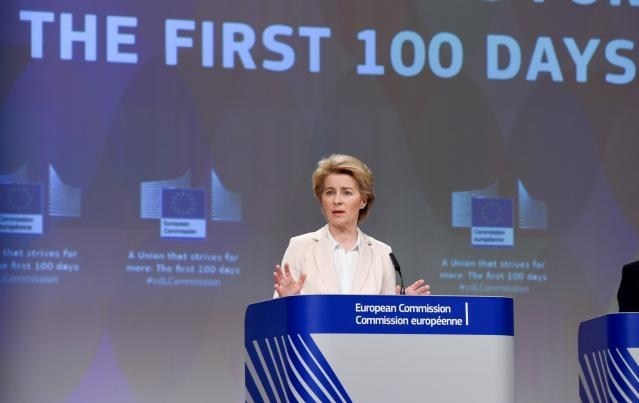The Commission marked today the first 100 days since it took office on 1 December 2019. On the one hand, it delivered as planned on its most important priorities, especially on the transition to climate change. On the other hand, it was unprepared for the crises that hit it, the outbreak of the coronavirus and the migration dispute with Turkey.
At her press conference on Monday (9 March), Commission President Ursula von der Leyen covered both the accomplishments during the first 100 days and the on-going crises though the latter were not called crises but new pressing priorities or unexpected challenges.
“We have made a good start in these first 100 days. We will work hard every single day to deliver a good future for the next generations of Europeans,” she summarized.
In her speech, von der Leyen said that she senses that citizens are asking for more Europe. She might be right but with the outbreak of the Coronavirus the Commission will be judged if it acted in time to coordinate the measures by member states to contain the spread of the virus.
Things looked definitely different when she and her team of partly handpicked commissioners took office last year after one month of delays. There was still uncertainty about Brexit and climate neutrality was only an ambition. Now Brexit is a fact and the Commission has started negotiations on the implementation of the withdrawal agreement.
The European Green Deal was presented as early as day 11, to be followed recently by a proposal for a binding Climate Law. It can be seen as a roadmap to stop climate change, cut pollution and protect biodiversity. However, a remaining issue is if the interim emission targets that will be set for 2030 will be sufficiently ambitious to avoid looming tipping points and lead to climate neutrality by 2050.
Another political priority from the very start was shaping Europe's digital future and von der Leyen highlighted a new strategy covering everything from cybersecurity to digital education, from platforms to supercomputing. For the first time, EU has also adopted a common position on how to address security risks related to the rollout of the fifth-generation of mobile networks (5G).
Much more is also in the pipeline. Von der Leyen announced among others that tomorrow, day 101, the Commission will launch a new industry strategy. It will translate the Commission’s climate, digital and geo-economic ambitions into concrete actions for the competitiveness of the EU's industry, in particular that of its small and medium sized enterprises.
On the following day, day 102, a circular economy action will be presented, setting out actions along the entire life cycle of products. Another important and long-awaited measure is a package on migration, asylum and relocation policies that will be announced directly after Easter, following consultations will all member states.
But the most pressing issue for the moment is the situation at the Greek-Turkish border and the dispute with Turkey on the 2016 EU-Turkey agreement on migration. “We don’t accept politically motivated pressure,” the Commission President underlined but added that both Greece and Turkey are pressured by migrants and need EU support.
At the writing of the article, President Erdogan has just arrived in Brussels for a meeting with Commission President von der Leyen and Council President Michel to discuss the acute situation at the Greek-Turkish border. At the press conference earlier today, von der Leyen described the talks as a restart of the dialogue with Turkey aiming first at reducing the tension at the border.
M. Apelblat
The Brussels Times

